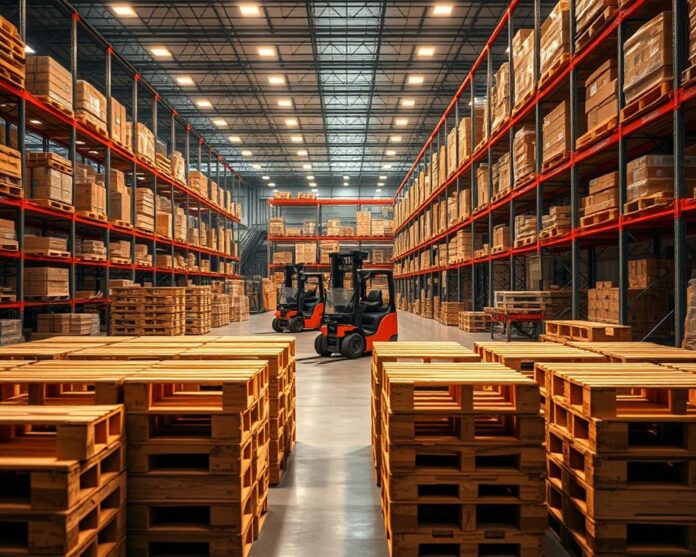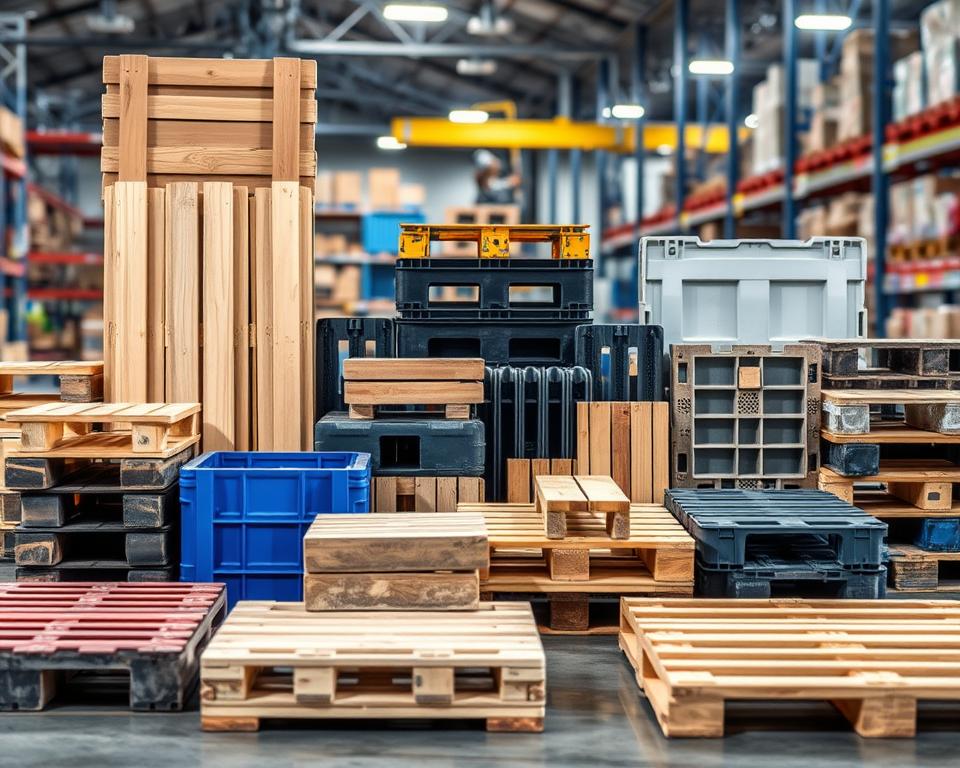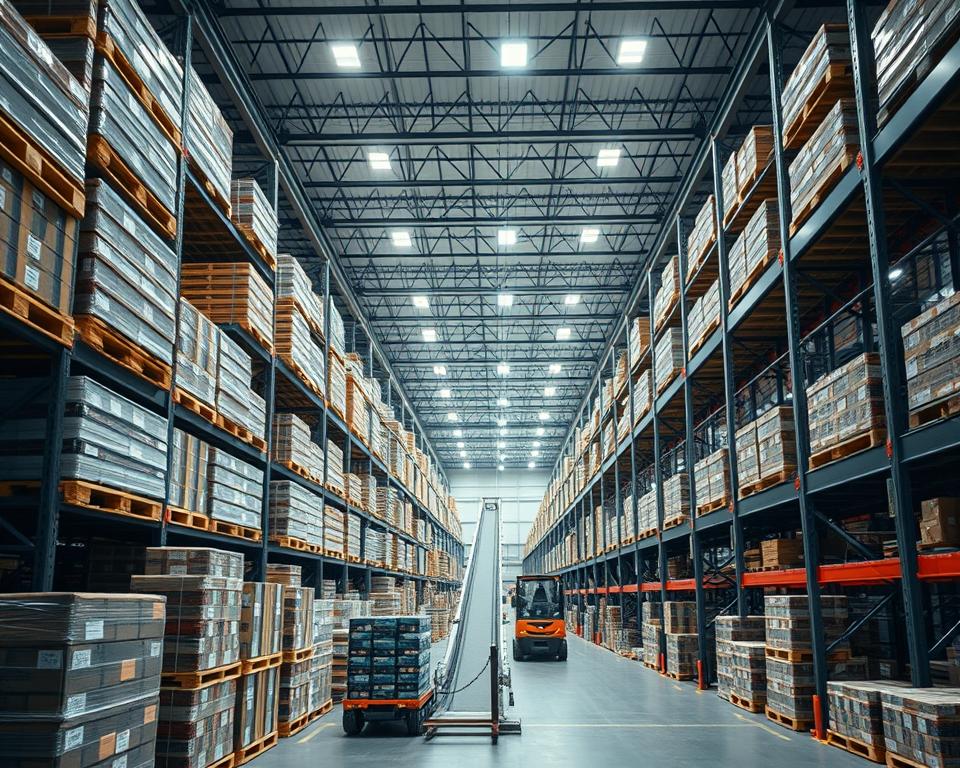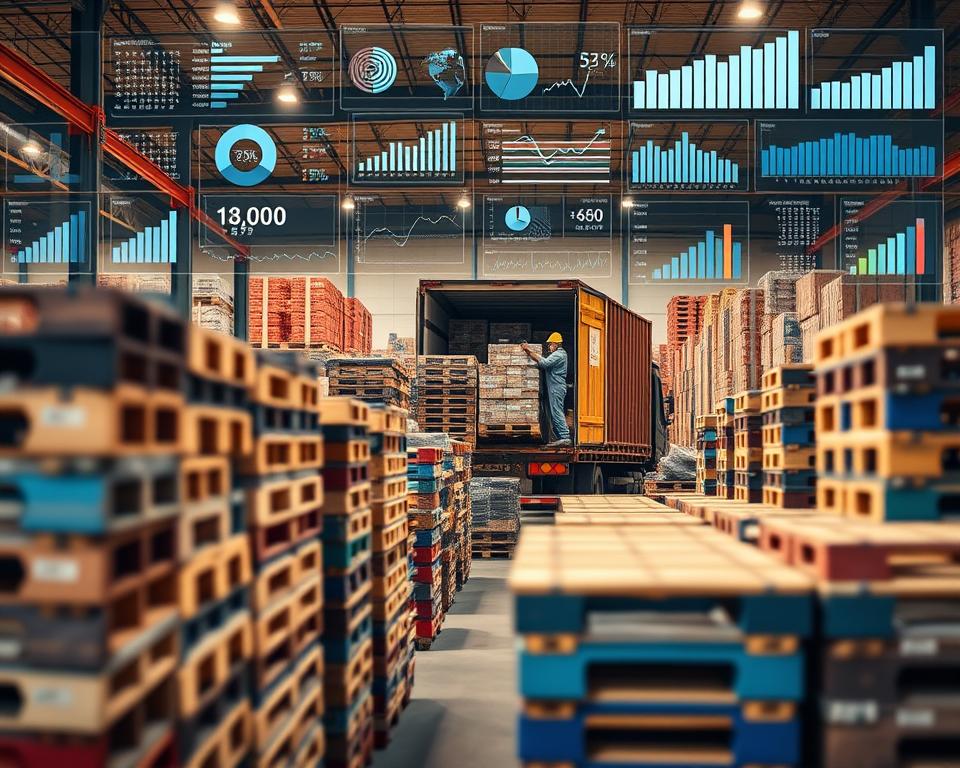
Keeping up with the fast global market is key for businesses. Pallets are a big help in this area. They are made of wood or plastic and help move and store goods. This makes logistics and supply chain work better.
In places like Tulsa, using pallets is very important. It helps companies save money and keep products safe while they move.
Key Takeaways
- Efficient supply chain management is key for businesses.
- Pallets are very important for logistics and supply chain work.
- Using pallets cuts down on handling costs and keeps products safe.
- Businesses in Tulsa and other places do well with pallets.
- Good logistics help businesses stay ahead in the market.
The Foundation of Global Logistics
Global logistics are made better by a simple, yet big, idea – the pallet. Pallets have been around for ages, but they really changed things in the early 1900s with forklifts. This started a new chapter in how we manage supply chains.
Historical Evolution of Pallets in Supply Chains
The evolution of pallets has been slow but steady. They started as simple wooden platforms for moving goods. Now, they are key to moving goods around the world.
Pallets got better as transportation and logistics tech improved. Forklifts made pallets in tulsa more useful, making it easier to load and unload goods.
The Unsung Heroes of Product Movement
Pallets are the “unsung heroes” of global logistics. They help move goods from makers to buyers, supporting trade and commerce worldwide.
Pallets make moving goods easier and more standard. They help warehouses, shipping, and stores work better together. This saves money and speeds up deliveries.
Understanding Pallet Types and Materials
Knowing the different pallet types and materials is key for good supply chain management. The right pallet can change logistics and costs for businesses in many fields.

Wood Pallets: Traditional Workhorses
Wood pallets are a top choice for many industries. They are affordable, easy to fix, and good for the environment. They are also great for moving goods.
Hardwood vs. Softwood Options
Choosing between hardwood and softwood pallets depends on what you need. Hardwood pallets are strong and don’t splinter easily. They’re best for heavy loads. Softwood pallets are lighter and cheaper, good for lighter items.
Heat Treatment and Compliance Standards
Wood pallets must be heat-treated for international shipping. This kills pests and diseases. It’s important for sending goods to countries with strict rules.
“The use of heat-treated wood pallets is a critical measure in preventing the spread of pests and diseases across borders.”
Plastic Pallets: Durability Meets Cleanliness
Plastic pallets are strong and clean, perfect for places like food and medicine. They resist moisture, chemicals, and pests. This makes them great for keeping things clean.
A report by Mordor Intelligence shows plastic pallets are growing in popularity. They’re seen as better than traditional materials.
| Pallet Material | Durability | Hygiene | Cost |
|---|---|---|---|
| Wood | Medium | Low | Low |
| Plastic | High | High | Medium |
| Metal | High | High | High |
Metal and Specialized Pallets: Industry-Specific Solutions
Metal pallets, like those made from steel and aluminum, are strong for heavy use. Specialized pallets are made for specific needs, like aerospace or hazardous materials.
In conclusion, picking the right pallet is very important. It affects logistics, follows rules, and changes business costs.
How Pallets Drive Supply Chain Efficiency
Pallets are key in supply chain management but often go unnoticed. They help move goods smoothly from production to delivery. This is vital for keeping things running well.
Standardizing pallets has made supply chains more efficient. Standard pallets work well with different transport and storage setups. This makes moving goods easier and faster.
Standardization and Intermodal Transport
Standardization makes moving goods between ships, trains, and trucks simple. You don’t need to repack goods. This cuts down on time and makes supply chains more reliable.
- Facilitates easy transfer between different transportation modes
- Reduces handling costs and minimizes damage to goods
- Enhances supply chain visibility and tracking
Warehouse Space Optimization
Pallet design and use are key to better warehouse space. They help use vertical space and fit with warehouse racks. This lets businesses store more without taking up more space.
Having a well-organized warehouse saves money and makes managing stock easier. It helps keep track of inventory better.

Labor and Time Savings
Pallets make handling goods easier, saving time and money. They make moving products in warehouses and during transport simpler. This cuts down on labor costs and reduces injury risks.
- Pallets simplify the loading and unloading process
- Reduce the need for manual handling, lowering labor costs
- Enable faster turnaround times for shipments
Pallets are essential for efficient supply chains. They improve standardization, warehouse use, and save on labor. This makes them a critical part of modern logistics.
The Economic Impact of Pallet Selection
Knowing how pallet selection affects a business is key. The right pallet can change costs in the short and long term.
Initial Investment vs. Long-term Value
Companies often look at the first cost of pallets. But, it’s important to see the long-term benefits. Durable pallets cost more at first but save money later by needing less repair.
A study by the National Wooden Pallet & Container Association shows a pallet’s life is about three years. But, good care can make it last longer. This means you won’t need to replace it as often.
Hidden Costs in Pallet Management
Managing pallets costs more than just buying them. There are hidden costs that can affect your supply chain’s efficiency.
Repair and Maintenance Expenses
Keeping pallets in good shape is key. Repairing damaged pallets can be expensive. A regular check and fix plan can help save money.
Transportation and Storage Considerations
The size and weight of pallets can change transport costs. Light pallets save fuel. Pallets that stack well also save space in storage.
“The right pallet can make a big difference in your supply chain’s bottom line. It’s not just about the cost; it’s about the value it brings to your operations.”
To cut costs, think about pallet durability, repair costs, and how they save space. This way, your supply chain can be more efficient and cost-effective.

Pallets in Tulsa: A Regional Logistics Hub
Tulsa is a key logistics hub in the U.S. It’s well-placed for efficient supply chain work. The city’s central spot and good transport links make it great for businesses to manage their logistics well.
Tulsa’s Strategic Geographic Advantage
Tulsa is in the heart of North America. This makes it easy to reach big markets in the U.S. and other places. This strategic spot helps businesses send their products fast and cheaply.
Local Pallet Manufacturers and Suppliers
Tulsa has many local pallet makers and suppliers. They offer different pallets for various industries.
Custom Pallet Solutions in Tulsa
Local makers create custom pallets for specific needs. This means businesses can find the perfect pallets for their work.
Recycled Pallet Options
Tulsa also has recycled pallets. These are cheaper and better for the planet. They’re a good choice for companies wanting to be green.
| Pallet Type | Material | Industry Use |
|---|---|---|
| Standard | Wood | General Manufacturing |
| Custom | Plastic | Pharmaceuticals |
| Recycled | Reclaimed Wood | Food and Beverage |
Industry-Specific Pallet Applications in Tulsa
Tulsa’s status as a logistics hub is boosted by its wide range of pallets. These are made for industries like oil and gas, aerospace, and manufacturing. Local businesses get pallets that fit their needs perfectly.
Sustainability and Environmental Considerations
The world is moving towards more sustainable ways. The pallet industry is changing too. It’s working to lessen its harm to the environment. This change is thanks to the need for green solutions.
The Circular Economy of Wooden Pallets
Wooden pallets are big in the industry. They’re now part of a circular economy. This means they’re reused, fixed, and recycled to last longer and waste less.
Companies are starting programs to take back pallets. They work with suppliers who recycle pallets. This helps the planet a lot.
Eco-Friendly Alternatives and Innovations
The industry is seeing more green options. Plastic pallets are strong and clean. They’re good for places that need to be very clean.
Pallets made from recycled stuff or wood from sustainable forests are also popular. New designs like lighter pallets and ones that fold up help cut down on emissions and save space.
Regulatory Compliance and Green Initiatives
Businesses are under pressure to be green. They must follow environmental rules and join green projects. This means using wood from forests that are managed well and cutting down on carbon by being efficient in how they move goods.
By going green, the pallet industry is helping the planet. It’s also making the whole supply chain more sustainable.
Technology Integration in Modern Pallet Systems
Technology is changing the simple pallet into a key part of smart supply chains. It’s making pallet systems more efficient, visible, and secure. This change is big for the logistics world.
RFID and Tracking Technologies
RFID and tracking tech are big in pallet systems now. They let us track pallets in real time. A study says RFID can cut manual work by up to 90% and track things more accurately.
This makes managing inventory better and lowers the chance of loss or theft.
![]()
Automated Pallet Handling Systems
Automated pallet systems are key in modern pallet tech. They use robots and conveyor belts to move pallets around. Automation cuts down on labor costs and protects goods from damage.
Using these systems can make things run much smoother. For example, a big logistics company saw their handling time drop by nearly 30%.
Data Analytics for Pallet Management
Data analytics is important for better pallet management. It helps managers decide on buying, keeping, and getting rid of pallets.
Predictive Maintenance Applications
Predictive maintenance uses data to guess when pallets need fixing or replacing. This stops supply chain problems before they start.
Inventory Optimization Tools
Inventory tools are a big plus of data analytics in pallet management. They help keep the right amount of pallets, saving money on too many or too few.
Risk Management and Pallet-Related Challenges
Managing risks is key in the pallet industry. Pallets are vital in today’s supply chains. Their failure can cause big problems.
Pallet risks include damage, contamination, and supply chain issues. It’s important to know these risks and find ways to handle them.
Damage Prevention Strategies
Stopping pallet damage is a big part of managing risks. Here are some ways to do it:
- Proper handling and storage techniques
- Regular inspection and maintenance of pallets
- Use of protective materials during transportation
Contamination and Sanitation Concerns
Contamination is a big risk for pallets, mainly in clean industries like food and pharma. To tackle this, companies can:
- Use pallets made from materials that are easy to clean and resistant to contamination
- Implement strict sanitation protocols for pallet handling and storage
- Consider using pallet covers or wraps to prevent contamination during transportation
By focusing on keeping pallets clean, businesses can protect their products and meet rules.
In summary, managing pallet risks needs a full plan that includes stopping damage and keeping pallets clean. Knowing these challenges and using good strategies can make supply chains stronger and cut down on losses.

Best Practices for Pallet Program Management
Pallet program management is key in today’s supply chains. It needs a smart plan to save money and cut waste. Good pallet management can save a lot, make supply chains clearer, and make operations better.
Developing an Effective Pallet Strategy
Creating a good pallet strategy means knowing your supply chain well. You need to think about what goods you ship, how much, and your logistics setup. Choosing the right pallet program is important.
Experts say a smart pallet plan can cut logistics costs by 10%. You should pick the right pallets for your needs. For example, food and medicine need special pallets.
Pallet Pooling and Rental Programs
Pallet pooling and rental are smart choices instead of buying pallets. They give you access to a managed pallet fleet when you need it. This makes managing pallets easier, saving time and effort.
A logistics expert says, “Pallet pooling makes our supply chain simpler. It lets us focus on our main work.” Pooling services take care of pallets, making sure they’re ready to use.
Maintenance and Inspection Protocols
Keeping pallets in good shape is essential. Regular checks help avoid damage to goods. It’s important to catch and fix any pallet problems early.
Good pallet care makes your supply chain safer and more efficient. Make sure everyone knows the rules for checking and fixing pallets.
Transforming Supply Chains Through Strategic Pallet Management
Efficient supply chain management is key for businesses to stay ahead in today’s fast market. A vital part of this is strategic pallet management. It can greatly change supply chains.
Companies can make big improvements in their supply chain by managing pallets well. Studies show a 20% cut in transport and handling costs. There’s also a drop in lead time and CO2 emissions.
Good pallet management boosts supply chain efficiency and cuts costs. It also makes businesses more sustainable. This leads to happier customers and more success for the business.
By focusing on strategic pallet management, companies can make their supply chains stronger. They can handle disruptions and market changes better. As the logistics world keeps changing, the role of strategic pallet management will grow.











































